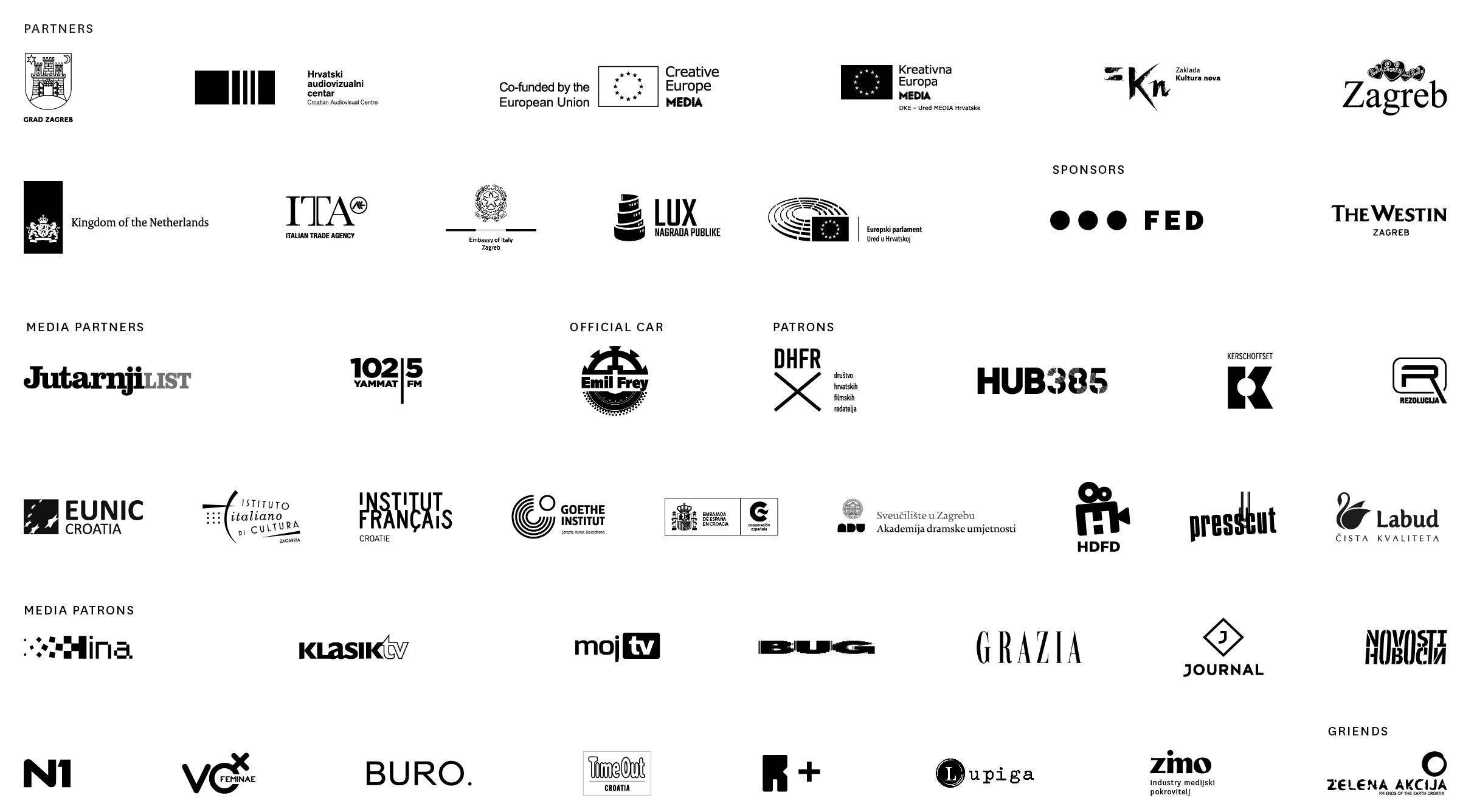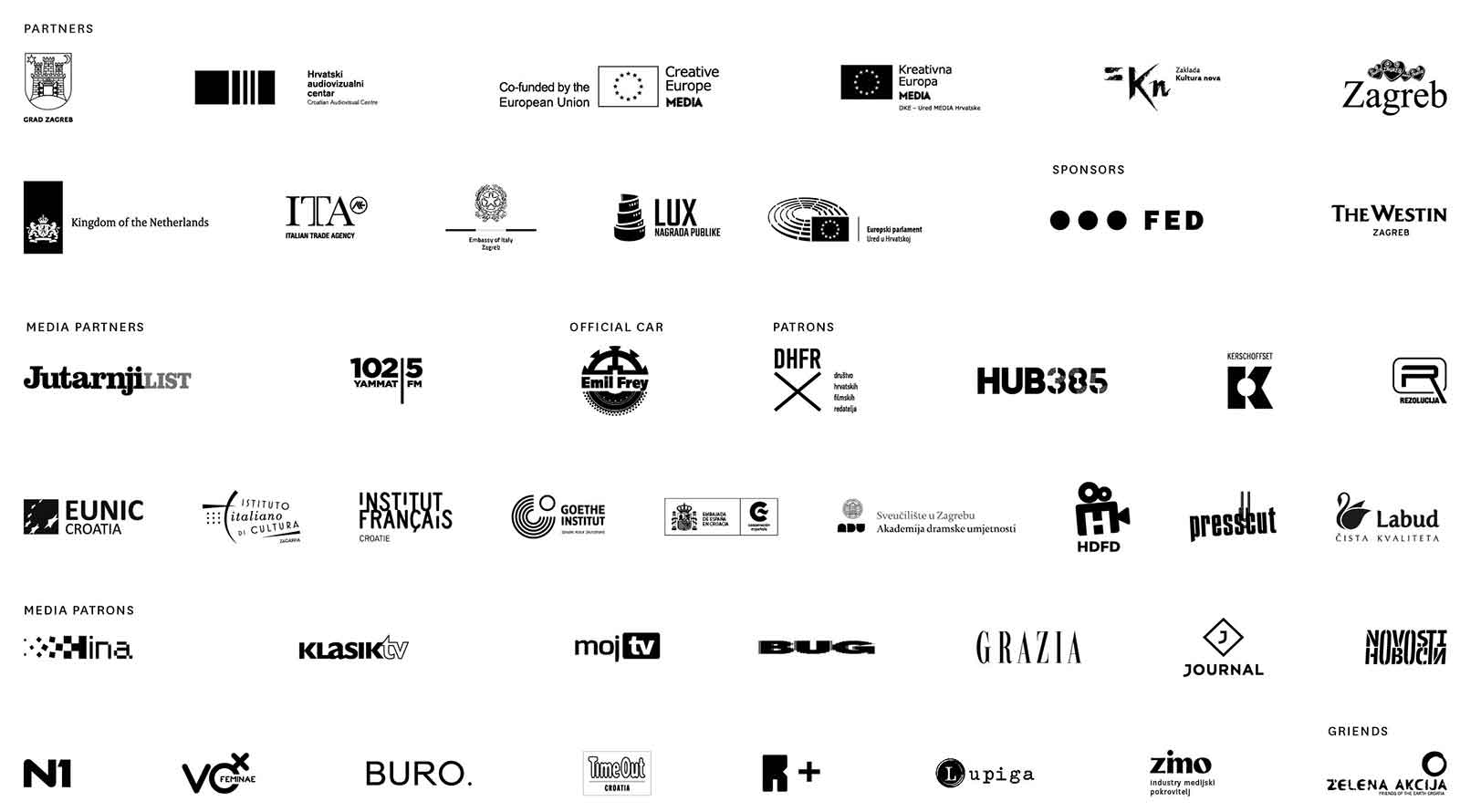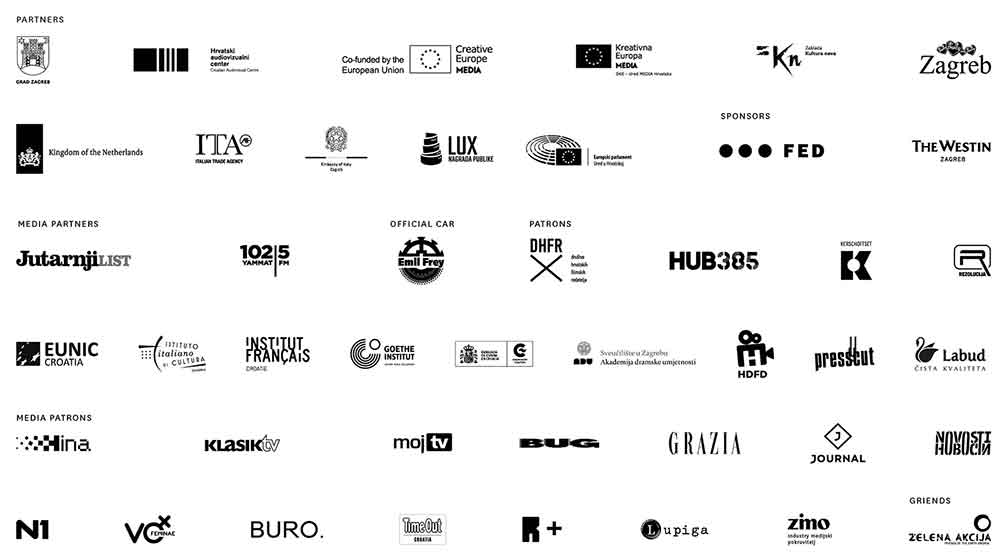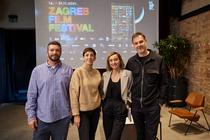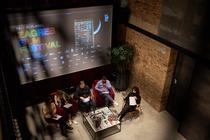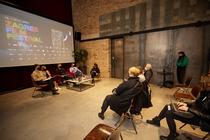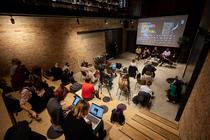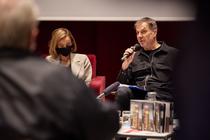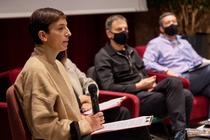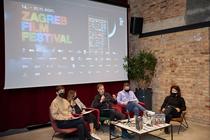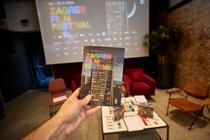ZFF’s Rich Program Presented: Nineteenth edition to the film lovers’ taste
04. November
The program of the 19th Zagreb Film Festival was presented. Taking place from November 14 to 21 in SC Cinema, Tuškanac Cinema, Theatre &TD, Urania and HUB 385, as well as online platforms kinoeuropa.hr i croatian.film, featuring as much as 134 film titles divided into five competition programs (Main program of feature, international short film and Croatian short film; Together Again and The Network of Festivals in the Adriatic Region), four side programs (The Great 5, Icebreakers, PLUS, and LUX), KinoKino festival for children and Industry, a program aimed at educating and connecting film professionals. The program was presented at a press conference by director Boris T. Matić, executive director Hrvoje Laurenta, producer Lana Matić and program coordinator Selma Mehadžić.
“After last year’s online edition, we’re excited the forthcoming festival is bringing us back to the audiences in cinemas! A part of our program will be available in around 20 cities outside of Zagreb, as well as online in the rest of Croatia. The lack of capacity in city cinemas and the closing of Europa Cinema are the reasons behind the return to the SC Cinema, but that brings us happy memories.
The number and quality of films we took into consideration for this year’s festival showed us how, despite the pandemic, filming hasn’t stopped on a global scale and how there are two very productive filming years behind us, and the audience will have one of the strongest main programs so far with the largest number of debutants awarded at A-level festivals. Among the 12 films in the main feature film program, we will present this year’s winners in Venice and Cannes and the triple winner at Sundance from female authors whose success will enter film encyclopedias. We are delighted and excited by the genre films of our debut authors, new and interesting actors, and the exploration of cultural heritage of faraway countries, but also the celebration of Croatian film – which is heralded by the national premiere of The Staffroom by Sonja Tarokić,” said Boris T. Matić.
Largest number of debutants awarded at A-level festivals in the main program
Three laureates from the world’s leading festivals from ZFF’s main competition program of feature films are works by female directors. This year’s Venice winner, Happening by Audrey Diwan, is a powerful and tense adaptation of a semiautobiographical novel by French novelist Annie Ernaux which dissects her experience of illegal abortion in 1960’s France. The Kosovar film Hive by Blerta Basholli became the first film in history to win Best Film, Best Director, and the Audience Award at Sundance’s international feature program. The plot of Hive takes place in the heart of the Kosovar patriarchy, and is based on the true story about a young widow Fahrija who, despite disapproval and overwhelming sense of hopelessness, starts her own production of ajvar, which also starts a small women’s revolution. The French Titan, directed by Julie Ducournau, won the Cannes Palme d’Or, thus making Ducournau only the second woman in history who won this prestigious award. After the cannibalistic debut Raw, the author’s second film, a mischievously twisted fantasy immersed in neon, sex and violence, once again explores the limits of horror films, this time of Cronenberg’s bodily horror.
Two competing films with fantastical elements are also award winners from A-level festivals. The creepy Icelandic folklore fairy tale Lamb, directed by Valdimar Jóhannsson, takes place at an isolated sheep farm and follows a childless couple (Noomi Rapace and Hilmir Snær Guðnason) who adopt an unusual hybrid newborn. The film won the Prize of Originality at the Un Certain Regard program in Cannes and was nominated for the EFA’s European Discovery Award. The Egyptian film Feathers starts with an unsuccessful magician’s trick which turns a pater familias of one family into a white chicken. The director for this black humor absurd story about the subversion of the Egyptian patriarchy, which won the Grand Prix and the FIPRESCI Award at Critics’ Week in Cannes, is Omar El Zohairy.
Five out of the 12 films from the competition program of feature films were selected as representatives of their home countries for the Oscar race as best foreign language film. Alongside the already mentioned Titan (France), Lamb (Iceland) and Hive (Kosovo), there are two more films from ZFF’s program in the running for the golden statue, films whose protagonists find love and understanding in completely unexpected places. Compartment No. 6, the second film by Finnish director Juho Kuosmanen (The Happiest Day in the Life of Olli Maki — ZFF 2016), follows the unusual encounter of a young Finnish archaeologist and a tipsy Russian miner. This melancholic and moving road movie, which is compared with Linklater’s classic Before Sunrise, won the Cannes Grand Prix. The prison drama from postwar Germany, Great Freedom by Sebastian Meise, winner of this year’s Jury Award in Cannes’ Un Certain Regard section, is a portrait of an unusual relationship between two inmates, Hans (Franz Rogowski — Victoria, Undine, Transit) who is imprisoned for being a homosexual and convicted murderer Viktor, which deftly intertwines the personal, sensual, and political.
Two award-winning films show love stories of European migrants and what they also have in common is that they produced two excellent acting talents. The provocative satire The Man Who Sold His Skin by Kaouther Ben Hania follows a young Syrian refugee who wants to meet up with his beloved wife but ends up as an exhibit in European museums. The lead role went to the fantastic Syrian actor Yahya Mahayni who won the Orizzonti Award in Venice, and Monica Bellucci is among the cast. As Far As I Can Walk by Stefan Arsenijević (Love and Other Crimes) is a modern interpretation of a Serbian love epic whose protagonist Strahinja, a Ghanaian migrant, searches for his beloved wife along the Balkan route. As Far As I Can Walk won a number of awards in Karlovy Vary, including Best Film, and Ibrahim Koma, the French actor from Mali, was named Best Actor.
The immigrant experience and relationship with one’s own cultural heritage are the backbone of the charming and touching American indie dramedy Queen of Glory by Nana Mensah, winner of Best Director at the Tribeca festival. The film follows the protagonist Sarah (Mensah), a Ghanaian American, while she more or less successfully balances her incompatible life choices. For instance, between her doctoral studies and moving to Ohio with a father of two or the role of a successful molecular biologist and obedient daughter.
The main feature film program of the 19th ZFF also features the long-awaited Croatian premiere of The Staffroom by Sonja Tarokić, which won the main jury Special Mention and Ecumenical Jury Commendation at Karlovy Vary. The feature debut by one of ZFF Checker’s most popular authors (On Shaky Ground — ZFF 2014, Golden Pram; I’m a Self-Made Woman; Red) in an Altman-like manner analyses the dynamics and inner conflicts of a community. The premiere of The Staffroom will mark the end of this project’s development, which was presented in 2013 at ZFF’s workshop My First Script. The feature selection is concluded with the film out of competition Not So Friendly Neighborhood Affair, a new comedy by Oscar-winning director Danis Tanović with Branko Đurić and Izudin Bajrović, inspired by one of the most controversial gastronomical dilemmas: where to eat the best ćevapi in town?
Ten international and ten Croatian short films in main competition programs
The main competition program of international short feature film includes ten titles: the Hong Kong film All the Crows in the World by director Tang Yi, winner of the Palme d’Or for best short film in Cannes 2021, the Kosovar Displaced by Samir Karahoda, winner of the Special Jury Mention at Sarajevo Film Festival and EFA award candidate, the Belgian Zonder Meer directed by Meltse Van Coillie and produced by the directorial duo Jessica Woodworth and Peter Brosens (Khadak — ZFF 2015; King of the Belgians — ZFF 2016; The Barefoot Emperor — ZFF 2019), Places, the new film by Vytautas Katkus, whose Community Gardens were featured in ZFF’s short film competition in 2019, Little Portugal by Victor Quintanilha, which won the jury special mention in Clermont-Ferrand, the Hungarian Break by Levente Kölcsey, the Ukrainian Dad’s Sneakers by Olha Zhurba, the North Macedonian North Pole by Marija Apcevska, the French 4 AM by Mehdi Fikri, and the Georgian Number 26 by Gvantsa Meparishvili.
Ten films were included into Checkers, the main competition program of Croatian short film: Bulky Waste by Andrija Tomić, Rockets by Saša Poštić and Pavle Kocanjer, Alone by Borna Zidarić (The Tenant, Checkers 2020), Horticulture by Silva Ćapin, Incendiary by David Gašo (Laci’s Great Escape 25 FPS 2021 – Green DCP Award), Fall of Our Summer by Karlo Vorih, Libero by Mladen Stanić (The White Room – Checkers, Golden Pram 2018), Loose by Paula Skelin, A Moving Target by Marko Dugonjić (The Rainfall, Checkers 2014 and 19 Albahari St 10000 Zagreb, Checkers 2017), and Everything Ahead by Mate Ugrin (The Heart of Sarajevo for best short film).
New films by authors familiar to ZFF audience
Selma Mehadžić presented the special features of the competition program Together Again: “The program features films of authors ZFF audience is familiar with, whose debut or early works we followed through the main competition program or through ZFF’s yearly film distribution. This year they are: A Hero, the newest film by two-time Oscar winner Asghar Farhadi (The Past — ZFF 2013; A Separation; The Salesman), is an intriguing drama about the fate of an individual in a society which loves to idolize people, but does not believe its own stories. A Chiara, a tense drama about the loss of innocence and an intriguing contribution to Jonas Carpignano’s popular trilogy (Mediterranea — ZFF 2015; Ciambra — ZFF 2017). Bad Luck Banging or Loony Porn, this year’s Berlinale winner directed by famed Romanian director Radu Jude, The Worst Person in the World, the new film by Norwegian director Joachim Trier (Reprise, Oslo, August 31, Thelma) with Renate Reinsve, winner of Best Actress in Cannes, The Box, a dark psychological thriller by Venezuelan master Lorenzo Vigas (From Afar, ZFF 2016), Amira, a drama about a teenager’s search for identity in the heart of the Israeli-Palestinian conflict by the winner of the 14th ZFF, Egyptian Mohamed Diab, and The Restless, a powerful Belgian drama by Joachim Lafosse (Keep Going – best film in the PLUS program, White Knights).”
Zagreb Film Festival awards the Golden Pram for Best Feature Film, Best International Short Film, and Best Croatian Short Film from the Checkers program. Jury members of the 19th Zagreb Film Festival are also known. The jury for ZFF’s feature film competition are actress and cultural activist Katia Pascariu (Bad Luck Banging or Loony Porn); director of Oasis, last year’s winner of ZFF, Ivan Ikić, and the award-winning director of photography Vanja Černjul. The best short film in the international competition and Checkers will be decided by last year’s winner of Checkers, director Sara Grgurić (In the Woods); Slovenian director Rok Biček (Class Enemy — ZFF 2014), and director and Herceg Novi Film Festival selector Ivan Bakrač.
First joint regional film festival’s program
Lana Matić presented the new competition program Network of Festivals in the Adriatic Region and the permanent side program The Great 5: “The first joint regional film festival Network of Festivals in the Adriatic Region united four festivals from four countries — Sarajevo Film Festival (Bosnia and Herzegovina), Auteur Film Festival (Serbia), Herceg Novi Film Festival (Montenegro), and Zagreb Film Festival (Croatia). Following the Spring edition, a successful cooperation continues this fall at ZFF with a selection of recent European films which, among others, include two films from the current selection for the European Film Award: Brother’s Keeper by Turkish director Ferit Karahan and raw drama Natural Light by Dénes Nagy. A special feature of the program is the classic The Fourteenth Day by Zdravko Velimirović, one of the first Yugoslavian films shown in the main selection of Cannes. The best film will be chosen by the audience and awarded with the Adriatic Audience Award which will be presented to the winner at the Auteur Film Festival in Belgrade.”
Numerous titles in side programs
The Great 5 side program, ZFF’s long-lasting program realized in collaboration with the network of cultural institutes of the European Union in Croatia (EUNIC), each year presents outstanding new films from Europe’s five biggest cinematographers: Great Britain, France, Germany, Spain, and Italy. This year’s Spanish representative is also Spain’s Oscar candidate, the film The Good Boss, a dark corporate satire in which Javier Bardem masterfully embodies the friendly face of capitalist corruption. France is presented with the film Gagarine, a cheerful social drama with elements of magic realism and nostalgic homage to Cité Gagarine, an Utopian collective housing project. The German film in the selection, And Tomorrow the Entire World, is an exciting thriller about the revolted antifascist youth which was shown at Venice and Toronto. Representing Great Britain is Boiling Point, a one-shot film whose actress Vinette Robinson won special mention in Karlovy Vary, while Italy is presented by the award-winning family drama Macaluso Sisters, a moving chronicle on transience and memory.
This year’s side programs, which will be available for viewing during the festival on kinoeuropa.hr and croatian.film, were presented by Hrvoje Laurenta: “The upcoming edition of ZFF also brings several online programs, among which is the retrospective theme program Icebreakers, selected by filmologist Diana Nenadić and featuring five films of East European female authors whose work opened up the Iron curtain. Among them are the most famous film by the mother of the Czech new wave Věra Chytilová and one of the greatest works of feminist cinematography, Daisies, and the first film by the great Polish director with a colorful oeuvre Agnieszka Holland Provincial Actors.”
Aside from Icebreakers, ZFF’s audience will also be able to see films online from the PLUS program, intended for high-schoolers, LUX program, which features three winners of the eponymous award of the European parliament of the same name, and Festivals in the Spotlight program, which features almost 50 recent short and feature-length titles selected for ZFF by program directors and selectors of several regional and European film festivals: from Sarajevo Film Festival, Mediterranean Film Festival Split and Ljubljana International Film Festival, all the way to Locarno Film Festival and Clermont-Ferrand International Short Film Festival.
KinoKino’s program tailored for youngest audience
The festival tailored for our youngest audience, the International film festival for children – KinoKino, will have its special, sixth edition within ZFF. This year’s festival program was presented by Selma Mehadžić: “When we launched KinoKino in 2016, the main goal was to present the rich selection of international feature films for children, which there are far too few in regular cinemas, but also to provide a special and different cinema experience for our youngest audience in order to encourage new generations of audiences and future film lovers.”
KinoKino’s main competition program features the most prominent new children’s films from all over the world, and there will also be new editions of the side programs — the selection of short feature films I Discover Every Day and the popular program First Time at the Cinema (FTATC), a block of animated films intended for preschool children who are introduced to moving images on the big screen for the first time.
The feature film program contains as many as four films from Scandinavia, among which the Norwegian film Sisters – The Summer We Found Our Superpowers, an epic journey of two sisters in search of their father injured in the mountains, stands out with the most festival awards. Simultaneously with Zagreb, Any Day Now from the main program will be screening across Croatia in the ZFF Travels program.
The best films of the 6th KinoKino will be decided, as every year, by a professional and children’s jury, while the audience will determine the winner of the audience award. This year’s professional jury consists of actress Iva Babić, director Saša Ban and professor and expert on children’s literature Dubravka Zima, while the children’s jury are Zagreb elementary school students Jan Nikola Baš, Sara Čolaković, Marta Mikac, Ursula Pavić, and Rita Vukmirović.
Industry brings together renowned experts and new film talents
Lana Matić presented the network for connecting professionals, Industry: “ZFF’s educational and practical platform — Industry — will host prominent film experts who will reveal specific creative and practical aspects of film production to the audience and interested participants, but also support new talents and their developing projects with their advice. Three masterclasses will be held: Serbian director and producer Stefan Arsenijević will analyze how he integrated the topic of modern refugees and the Balkan migration route into his film As Far As I Can Walk, the lead actress from Bad Luck Banging or Loony Porn Katia Pascariu will reveal more about working with one of the greatest contemporary Romanian directors, while the Croatian cinematographer working in Hollywood Vanja Černjul will analyze his most important film and television projects. Masterclass lectures by Stefan Arsenijević and Katia Pascariu are organized in collaboration with the Filmmakers Association of Croatia, while Vanja Černjula’s masterclass is organized with Restart.
Television series will be the focus of the program Series Rough Pitch – The Balkan Way which is jointly organized by Creative Europe Desk – MEDIA Office from Croatia, Bulgaria, Montenegro, Greece, and Slovenia. The projects selected to participate via public call will be presented to the international jury of experts and moderated by head of the Creative Europe Desk — MEDIA Office Croatia Martina Petrović. The industry of video games will be the topic of the event titled Why are video games different…?, organized in collaboration with the Goethe Institute, the French Institute, and the Academy of Dramatic Art Zagreb. The goal of the panel Spotlight Italy is to strengthen co-production collaborations between Croatia and Italy, organized by the Italian Institute for International Trade in Zagreb — ICE Agency, in cooperation with the Italian Embassy in Croatia, the Italian Cultural Institute in Zagreb and ZFF Industry. The workshop and pitching programs, as one of the central segments of Industry, encompass various educational and practical sessions aimed at almost all age groups: from those intended for schoolchildren within the KinoKino festival (My First Video Game, Read What You Watch), to those for rising film prospects (My First Script, Industry Youth!), and those aimed for somewhat older film lovers (film critics’ workshop for 54+).”
In an effort to contribute to the development of environmental awareness, as the signatory of the European initiative We Chose Reuse, in collaboration with our partners Green Action, social cooperative Humana Nova and Environmental Film Festival, Zagreb Film Festival started a series of activities in order to become a greener festival. In line with the unofficial slogan We recycle everything but films!, the use of paper and plastic is limited: the festival catalog is published exclusively digitally, the program booklets are printed on recycled paper, plastic festival passes are replaced with digital and textile ones, while the whole festival merchandise is made from recycled and environmentally friendly materials. In order to encourage the reuse of objects, ZFF will put up a Swap Cabinet in SC during the festival where visitors will be able to deposit useful objects such as books and clothes. Also, cardboard boxes for recycling will be available during the festival at all festival locations, and there will be a Green island in SC for recycling electronic waste. The educational part of the green festival program includes a Climate Quiz and online workshop How To Reduce Your Personal Waste led by Ana Marija Mileusnić from Zelena Akcija, and as part of the Festivals in the Spotlight program, the Environmental Film Festival, organized since 2014 by the Activist Group of Green Action, will be presented along with the screening of the Slovenian film The Undamaged.
This year as well, ZFF Travels will also spread some of the fantastic ZFF atmosphere beyond the capital. Simultaneously with Zagreb, audiences in record 20 locations locations all over Croatia will enjoy a selection of films: Split, Korčula, Pula, Veli Lošinj, Rijeka, Nova Gradiška, Samobor, Glina, Šibenik, Bjelovar, Dubrovnik, Velika Gorica, Varaždin, Koprivnica, SOS Children’s Village Ladimirevci, SOS Children’s Village Lekenik, Prelog, Slatina, Osijek and Zadar. Special treats from ZFF’s film package include The Man Who Sold His Skin from the main competition program, The Restless from Together Again, last year’s winner Oasis, and Any Day Now from the KinoKino festival program.
Ticket presale starts November 4
The main competition program is screened in the mornings and evenings in SC Cinema and Tuškanac Cinema, and films from the side program in Tuškanac Cinema, Theatre &TD, and Urania. Ticket prices range from 20 HRK (for morning screenings of feature films) to 30 HRK for evening screenings and screenings of films from the Together Again and The Great 5 programs. Ticket presale starts November 4 online at kupiulaznicu.2021.zff.hr, and tickets will be available on the same webpage for general sale. During presale, from November 4 to 13, the tickets will be 5 HRK cheaper. General sale of tickets at the festival locations starts November 14 at the SC ticket office (15:00 – 21:00 h), and from November 15 to 20 working hours of the SC ticket office and Tuškanac ticket office will be from 10:00 to 22:00 h. The complete film program and schedule can be found on our official page 2021.zff.hr.
Due to the epidemiological situation, entrance to screenings and festival programs will be possible with a valid EU digital COVID pass or a valid negative test (PCR test up to 72 hours beforehand, rapid lateral flow test up to 48 hours).
Zagreb Film Festival is financially supported by the City Office for Culture, Croatian Audiovisual Center, Creative Europe — Subprogram MEDIA, Kultura Nova Foundation and the Zagreb Tourist Board. Media coverage of the festival is provided by Jutarnji List and Yammat FM. The Best Film award of the Checkers program is provided by the Croatian Film Directors’ Guild.
